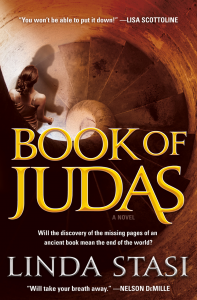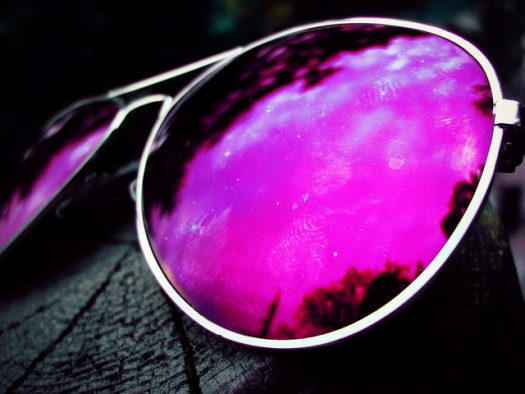Should You Use Rose-Colored Glasses in Fiction?
By Guest | October 5, 2017 |
Please welcome New York Daily News columnist and novelist Linda Stasi to Writer Unboxed today, to talk about grit and realism in fiction — and the effect of Real Life. More about her:
Linda Stasi, the popular columnist for the New York Daily News–her Wednesday and full-page Sunday columns have reached more than 600,000 in a single day–and previously for the New York Post, is also an on-camera TV co-host with Mark Simone on NY 1 -Spectrum “What a Week!”
Stasi’s first novel, The Sixth Station, was selected as a finalist for the Mary Higgins Clark Award, and was hailed as, “A helluva religious thriller,” by Nelson DeMille, while Steve Berry said, “You’ll be grabbing the pages so tight your knuckles will turn white!”
Stasi’s anxiously awaited sequel, Book of Judas, has received acclaim from mega bestselling authors such as Sherrilyn Kenyon, who calls it, “An innovative masterpiece!”
Stasi, who has also authored five nonfiction books, has appeared on The Today Show, Good Morning America, The View, and many others.
She was named “One of the Fifty Most Powerful Women in NYC” and has won numerous awards including Best Columnist by the Newswomen’s Club of NY, Best Humor Columnist, and Woman of the Year by the Boys Town of Italy for her charitable work such as driving a tractor-trailer in an 18-truck convoy from NYC to the gulf states with relief supplies for Hurricane Katrina victims.
You can learn more about Linda and the Alessandra Russo series at lindastasi.com and by following her on Facebook and Twitter.
Should You Use Rose-Colored Glasses in Fiction?
I once had a pair of rose-colored glasses, but the thing is? They kept sliding south forcing me to only look down at the dirt on the street, or, worse, to only look up to at the clouds in the sky—just to keep them on. Both views distorted reality so I threw them away. And I’m glad of it. I decided it was just better to look straight ahead.
Rose-colored glasses don’t work if you’re a reporter (like me), and they really don’t work if you are, or want to be, a novelist (like the other me). Even funny fiction and way-out fantasy have to have a dark side to feel real. That’s the first thing I found out while learning to switch from the grit of real life news to the fictional world of religious and conspiracy thrillers.
Fantasy, conspiracy, and all fiction in fact, are like good comedy. You need to have one foot in the dark side, one foot in the light, and your head in reality for your fiction to read real.
I was always told, as I’m sure you have been, that we should only write what we know—right? But hell—what did I know about religion before my first novel came to me on a road trip through (I swear) the backroads of Turkey? Answer: Not very much.
But then again, what did I know about John Gotti before he began writing to me from federal prison, or pedophile priests before one decided to “confess” to me? What did I know about hurricanes or driving a truck before I drove a tractor/trailer to Mississippi in an 18-truck convoy bringing relief supplies to Hurricane Katrina victims? What did I know about murder, epidemics and frivolous stuff like fancy dress balls, the famous, the infamous and those just plain awful celebrities before I had to report on them? Answer: So much nothing that it’s shocking.
So when I began to write my first novel, I brought with me all my reporter skills, and all my training in reality; all that stuff I learned from covering all that stuff. I ended up fictionalizing what I knew, and what I didn’t know I spent time learning inside and out.
Not that it was a walk in the park—more like a walk in the park in the dark.
I mean seriously? It took me six years to investigate and research my first novel, which means I drove through five countries alone, road tripped it through Italy with an exorcist priest from the Vatican, climbed Montségur twice, stayed with Monks in the mountains of Manopello Italy who guard a relic with what I believe has the DNA of Jesus on it, and hung with a crazy cloistered, hermit nun in her two room house on a mountain.
For Book of Judas, I traveled to Israel and found a distant, distant relative. I was then allowed to go deep under the foundations of his home into what was recently unearthed there: a 3,000-year-old burial tomb. That’s when the lights blew and I was in the dark underground with hundreds of the long-dead souls. Scary? Yes. Beautiful? Incredibly so.
For me, going to the places that I write about gives me not just insight, but mean something extraordinary, and oftentimes, literally out of this world, happens to me which ends up enriching the story in ways I would never have been able to make up.
But to each of those new experiences I bring my own baggage: what I know and feel from the experiences I’ve already had. No just the crazy news stuff, but the raw of me.

When her infant son is placed in mortal danger, New York City reporter Alessandra Russo is forced to save him by tracking down the missing pages of the Gospel of Judas, a heretical manuscript that was unearthed in Al-Minya, Egypt, in the 1970s. The manuscript declares that Judas was the beloved, not the betrayer, of Jesus.
My ongoing character, Alessandra Russo, whether I like it or not, therefore is me. Well, me with a few pounds and several years shaved off. But although she is a character who sees the world through jaded eyes, she herself isn’t jaded—as I hope I’m not, despite all I’ve seen. But what Alessandra and I both experience is real sorrow, and sometimes depths of fear and despair—the reality that a writer can’t make up any more than any of us can create life from plastic.
For me, the pains I’ve experienced, as well as the joy, the love, the hatred, and here’s the tricky part—the passionate sex—all has to be as real in my novels as was for me when I experienced it. Tough, I know. It’s like taking a naked picture of yourself before you shaved your legs and went on a diet. Shaving your legs is easy, dieting is tough, but writing real without those rose-colored glasses? Impossible yet possible, embarrassing and—for me, anyway— necessary.
Where did I throw those damned glasses anyway?
How about you? Do your stories veer rosy, or toward the grit of life? As a reader, what type of novel do you crave most frequently? What does that shade of life feed in you?











Linda,
I tend to lean toward the grit, but I think under the grit is where the treasure lies. It’s fun to read about a character who starts out wearing somewhat rose-colored glasses, only to have the lenses shattered forthwith. I know, that sounds mean, but the catharsis in a character is what I crave. And I loved reading about your adventures-in-research. Esp. the part about the lights going out in the tomb!!
Ask me, in fiction the best combination is a protagonist who has both friends and problems. Who is both secure and struggling. Living in a world both warm and malevolent.
There are so many protagonists who are helpless and in pain. They are victims struggling for survival. It’s human and real but also wearisome to read.
Reality is all of it. Good and bad. People who are helpful and people who are murderous. More the former than the latter. For me the glasses are green on one side and yellow on the other.
The villain in your novel The Sixth Station, Demiel ben Yusef, embodies the duality. Terrorist or Second Coming? So, perhaps not surprising that you have posed the question today!
Thank you for sharing with us today Linda.
I’m always on the lookout for stories that bounce historicism and dogmatism off each other, so I’ll be checking out your works. In answering your question, yes I try to use rose-colored glasses in writing, but I also have those glasses come off as the story unfolds. I think that ‘true grit’ is being open to changes in your world view, and that is true for characters in any fiction genre.
Thanks for the comments. I guess when the protagonist is a reporter, it would be wrong if she wore rose colored glasses after even one day on the job. I think if I were writing about a 21 year old it might be OK, but my protagonist Alessandra Russo is 42 and has been a war correspondent. If she wore rose colored glasses she wouldn’t have lasted! (of course I had plenty of rejections on my first book because editors wanted her younger, taller, less flawed and more like a superhero. Personally I’ve never met a 6’foot supermodel/superhero reporter, but that’s just me. Hahaha
I agree it depends on the character and it depends on the story. I would also consider the comparison of gritty reality and honest writing. It’s possible to have rose-colored glasses on the level of the story – a feel good fantasy – but still maintain honesty and integrity of the inner self of your characters. It’s important to have conflict, but it doesn’t have to be gritty to provide peril. Dark and Light, yes, absolutely necessary. But I would say you can have rose-colored darkness in comparison to earthly gritty reality. I often read fiction to escape from the news. I grew up in Miami. I get what gritty is and I know its reality well. Sometimes I want to contemplate the inner struggles of dark and light behind those events or motivations in a fantasy ‘safe-world’ where the threat of them is securely held at bay from me as a reader. In fiction I at least want a story where tragedy is a sacrifice that brings a greater good in contrast to gritty reality where violence is often senseless and can leave one without hope.
Definitely not rosy. For me, writing is what I need to do to work through all the grit of life. And those are the books I like to read too. I’ve got no time for rosy. Redemptive, yes. But rosy, no.
I’m with you, Erin Bartels, and thanks for sharing your writing life with us, Linda. Back to the keyboard.
Thank you for your thoughts, Linda. You’ve had such a wealth of experience. Your new book looks fascinating. One I will definitely put on my must read list.
I love your reference to rose-colored glasses and the need to take them off while writing. I’ll keep that in mind as I go forward. When I’ve dug down deep in the dirt, I’ve found gems I didn’t know were there.
“Fantasy, conspiracy, and all fiction in fact, are like good comedy. You need to have one foot in the dark side, one foot in the light, and your head in reality for your fiction to read real.”
As someone who loves my rose-colored glasses, but also has a penchant for the shadow-side of people, this was absolutely perfect. And it holds for memoir too. Thank you.